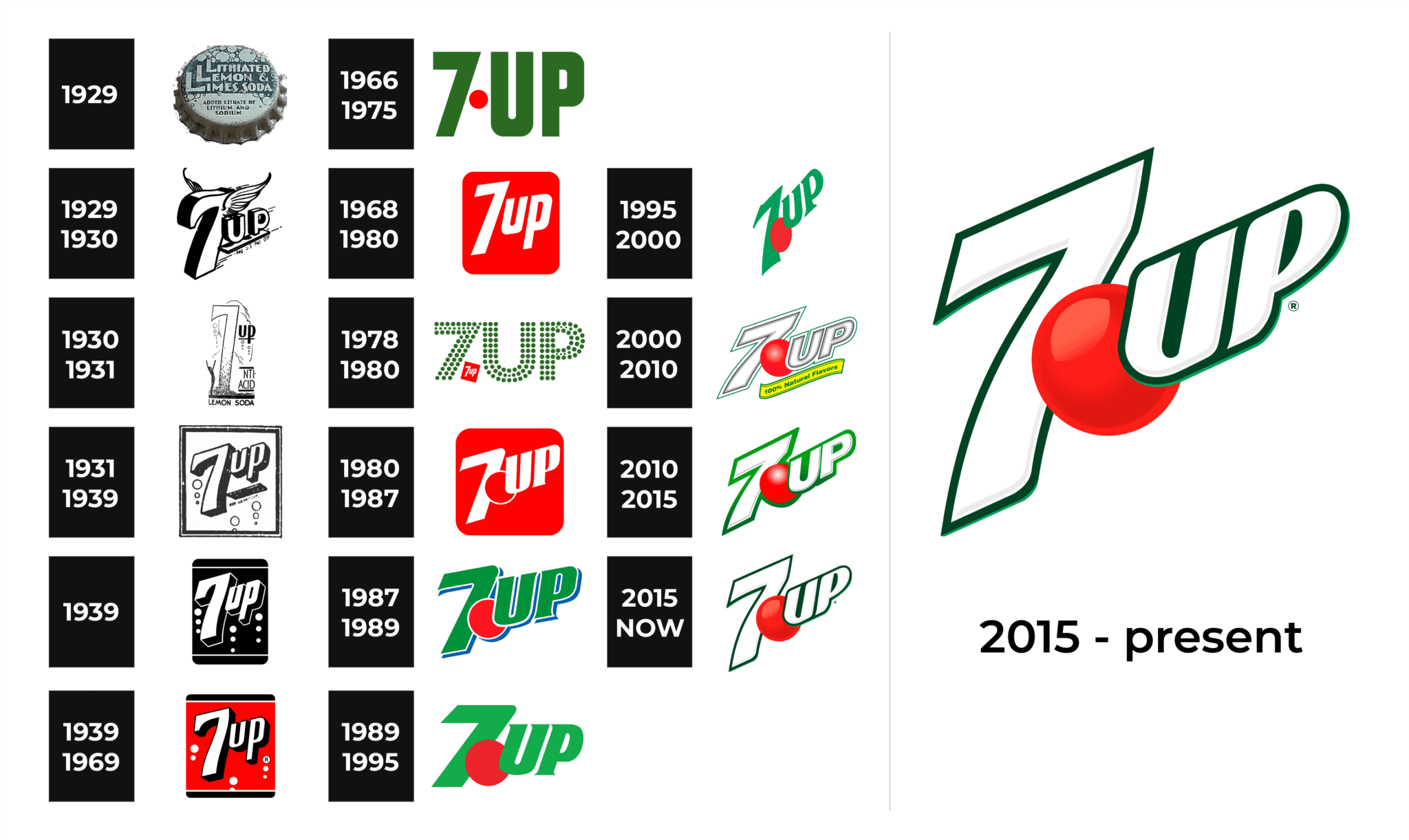What makes 7Up one of the most iconic soft drinks in the world? The answer lies in its fascinating history, spanning nearly a century of innovation, marketing brilliance, and cultural relevance. Born in the early 20th century, 7Up has grown from a small-time soda to a globally recognized brand. Its journey is not just about carbonated beverages but also about how a simple drink became a symbol of refreshment and fun. With its unique lemon-lime flavor and a story full of twists and turns, the history of 7Up offers valuable insights into the evolution of the beverage industry.
The story of 7Up begins in 1929, during the Great Depression, when Charles Leiper Grigg, a visionary inventor, introduced the world to this fizzy drink. Originally named "Bib-Label Lithiated Lemon-Lime Soda," it quickly gained popularity for its distinctive taste and calming properties, thanks to its original lithium citrate formula. Over the decades, 7Up transformed its branding, ingredients, and marketing strategies to stay relevant and appealing to changing consumer preferences. The history of 7Up is a testament to resilience and adaptability, making it a timeless favorite.
From its humble beginnings to its status as a global powerhouse, 7Up has consistently reinvented itself while staying true to its core identity. Its journey reflects broader trends in the food and beverage industry, such as the shift toward healthier options and the importance of creative advertising. Whether you're a fan of its crisp flavor or simply curious about its origins, exploring the history of 7Up offers a captivating glimpse into the world of soft drinks and their cultural impact.
Read also:Hilltop Motel Oceanside Your Perfect Coastal Getaway
Table of Contents
- How Did 7Up Begin?
- Who Was the Brain Behind 7Up?
- What Role Did Marketing Play in 7Up's Success?
- How Did 7Up Evolve Over the Years?
- What Makes 7Up Unique in the Beverage Industry?
- The Ingredients of 7Up: A Closer Look
- The Global Expansion of 7Up
- Why Does the History of 7Up Matter?
- Fun Facts About 7Up You Didn’t Know
- What Can We Learn from the History of 7Up?
How Did 7Up Begin?
The origins of 7Up trace back to 1929, when Charles Leiper Grigg launched the drink as "Bib-Label Lithiated Lemon-Lime Soda." At the time, the beverage industry was booming, with numerous companies vying for consumer attention. Grigg's creation stood out due to its unique lemon-lime flavor and the inclusion of lithium citrate, a compound believed to have mood-stabilizing properties. This innovative ingredient made 7Up an instant hit, especially during a time when people were looking for comfort and relief amid the economic turmoil of the Great Depression.
Initially, the drink was marketed as a remedy for everyday stress and fatigue. Its tagline, "It Takes the ‘Ouch’ Out of Grouch," highlighted its calming effects. However, as regulations around food and beverages tightened, lithium citrate was eventually removed from the formula in 1948. Despite this change, 7Up retained its popularity, thanks to its refreshing taste and clever advertising campaigns.
Who Was the Brain Behind 7Up?
Charles Leiper Grigg was the mastermind behind the creation of 7Up. A talented inventor and marketer, Grigg had previously worked in the advertising department of a soft drink company before venturing out on his own. His experience in the industry gave him the insight needed to develop a product that would stand out in a crowded market.
Here’s a brief overview of Grigg's life and contributions:
| Full Name | Charles Leiper Grigg |
|---|---|
| Date of Birth | May 11, 1868 |
| Place of Birth | Price Branch, Missouri, USA |
| Notable Achievement | Inventor of 7Up |
| Legacy | Revolutionized the soft drink industry with innovative flavors and marketing strategies. |
Grigg's vision and creativity laid the foundation for 7Up's success. His ability to identify consumer needs and translate them into a compelling product remains a key lesson for entrepreneurs today.
What Role Did Marketing Play in 7Up's Success?
One of the most significant factors behind 7Up's enduring popularity is its innovative marketing campaigns. From its early days, the brand focused on creating a strong identity that resonated with consumers. The name "7Up" itself is shrouded in mystery, with various theories suggesting it refers to the drink's seven ingredients or its uplifting qualities.
Read also:Goodwill Salinas Hours Everything You Need To Know
Over the years, 7Up's advertisements have captured the imagination of audiences worldwide. In the 1960s and 1970s, the brand became synonymous with youth culture, thanks to its association with the "Uncola" campaign. This clever tagline positioned 7Up as a refreshing alternative to cola drinks, appealing to those seeking something different. The campaign's success demonstrated the power of branding and creativity in shaping consumer perceptions.
How Did 7Up Evolve Over the Years?
The history of 7Up is marked by constant evolution. In the 1950s, the brand underwent a major rebranding effort, dropping references to lithium and focusing solely on its lemon-lime flavor. This shift coincided with growing concerns about the safety of lithium citrate, prompting the company to adapt to changing regulations and consumer expectations.
As the decades passed, 7Up introduced new variations to cater to diverse tastes. Some notable examples include Diet 7Up, Cherry 7Up, and 7Up Plus. Each iteration aimed to expand the brand's reach while maintaining its core appeal. Today, 7Up continues to innovate, offering products that align with modern health trends, such as reduced sugar and natural ingredients.
What Makes 7Up Unique in the Beverage Industry?
7Up's uniqueness lies in its ability to balance tradition and innovation. While many soft drinks struggle to maintain relevance, 7Up has consistently adapted to changing times without losing its identity. Its lemon-lime flavor remains a hallmark of the brand, setting it apart from competitors in the crowded beverage market.
Additionally, 7Up's commitment to creativity and fun has kept it at the forefront of pop culture. From its catchy jingles to its collaborations with artists and influencers, the brand has always found ways to engage with its audience. This ability to connect emotionally with consumers has been a key driver of its success.
The Ingredients of 7Up: A Closer Look
Understanding the ingredients of 7Up provides insight into its appeal. The drink's signature flavor comes from a blend of natural lemon and lime oils, which give it a tangy yet refreshing taste. Over the years, the formula has been refined to meet health and safety standards while preserving its distinctive character.
Here are the primary components of 7Up:
- Carbonated Water
- High Fructose Corn Syrup (or sugar in some versions)
- Citric Acid
- Natural Flavors
- Sodium Citrate
While some critics argue that soft drinks like 7Up contribute to unhealthy lifestyles, the brand has responded by offering low-calorie and sugar-free options. These efforts reflect a broader commitment to meeting consumer demands for healthier choices.
The Global Expansion of 7Up
From its origins in the United States, 7Up has grown into a global phenomenon. The drink is now available in over 100 countries, each with its own unique spin on the classic formula. In some regions, 7Up is even used as a mixer in cocktails, further expanding its versatility.
The global success of 7Up can be attributed to strategic partnerships and localized marketing campaigns. For example, in Asia, the brand often collaborates with local celebrities and events to build a strong presence. This adaptability has allowed 7Up to thrive in diverse markets, making it a truly international brand.
Why Does the History of 7Up Matter?
The history of 7Up is more than just a tale of a soft drink; it's a reflection of broader societal changes. From its early days as a lithium-infused remedy to its current status as a global icon, 7Up has mirrored shifts in consumer preferences, regulatory frameworks, and marketing strategies.
Studying the history of 7Up offers valuable lessons for businesses and entrepreneurs. It highlights the importance of adaptability, creativity, and resilience in navigating challenges. Moreover, it underscores the power of branding in building lasting connections with consumers.
Fun Facts About 7Up You Didn’t Know
Here are some intriguing facts about 7Up that might surprise you:
- 7Up was originally sold in pharmacies and marketed as a medicinal drink.
- The drink's name was inspired by the seven ingredients in its original formula.
- 7Up was the first soft drink to be sold in cans in the 1930s.
- The "Uncola" campaign helped 7Up carve a niche in a cola-dominated market.
What Can We Learn from the History of 7Up?
The history of 7Up teaches us that innovation and adaptability are crucial for long-term success. By staying true to its core identity while embracing change, 7Up has managed to remain relevant for nearly a century. Its journey serves as a reminder that businesses must continuously evolve to meet the needs of their customers.
Moreover, the story of 7Up emphasizes the importance of storytelling in building a brand. Through clever marketing and a focus on consumer engagement, 7Up has created a legacy that transcends its status as a mere beverage. As we look to the future, the lessons from the history of 7Up will undoubtedly continue to inspire entrepreneurs and marketers alike.

